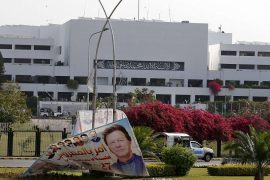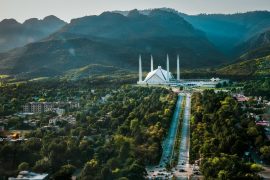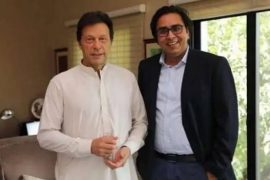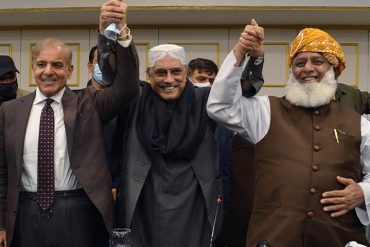STRAIGHT TALK by Hafeez Khan
I grew up in the sixties in Abbottabad, a pretty and peaceful town nestled amongst pine trees in the foothills of Kashmir. It was named after Major James Abbott. A garrison city, Abbottabad was home to Pakistan Military Academy (PMA) and many Army units. My alma mater Burn Hall School was located on Mansehra road. It was an elegant building with huge sports fields. It attracted students from all over Pakistan.
President Ayub was in power. His martial law had put a stop to the large scale deforestation by the timber mafia, for a while the pine trees were safe. We lived on the opposite side of the city from my school. As a student, owning a bicycle was quite exhilarating and a liberating experience. One of my fondest memories is cycling to school with friends. Nearly sixty years on, I share these with Salim Manzar, an actuarial wizard based in New Jersey.
We lived in an area called Malikpura where a number of other government officials resided too. Everyone knew everyone. A short distance from our house was the residence of a civil judge. He had a reputation of being corrupt. His lavish lifestyle was clearly beyond the salary of a judge. His sons were quite friendly and about the same age as me, but I was banned by my father to interact with them. Other family members were also instructed to stay away. Being corrupt led to an unspoken social sanction.
That was the sixties. Moral values were a major consideration. Bureaucrats, government officials, judges excelled in their professions through their competence. The laws developed by the British Raj were followed by and large. After Ayub’s regime we had a short military rule of Yahya Khan which was followed by Mr. Bhutto’s rule in the seventies. While ZAB’s era created a lot of social turmoil and rudely interrupted Pakistan’s economic ascendancy, financial corruption never became an issue.
During the eighties Zia Ul Haq’s control on power was complete. Though never accused of corruption himself, the generals around him amassed huge wealth illegally. Five years into his rule he moved to gain legitimacy through holding elections on a non party basis. That is when the seeds of corruption were sowed in our society. In his effort to break the gridlock of rural elite on power, he picked up business men as his allies. This gave birth to the Sharif family’s ascendency to three decades of power, only interrupted by General Musharraf.
This is when Pakistan’s downhill journey started. The Sharifs amassed a huge fortune heading Punjab. The number of industries they owned multiplied sharply. They sharpened their skills of borrowing from banks on shaky or cooked up collateral. They laid the basis of using political power for personal gains. Moral depravity began under them.
Their main opponent was Benazir’s PPP. She had returned from a prolonged self exile. Having studied and lived abroad most of her adult life, Benazir was a novice in using political influence to gain wealth. However, her close advisors convinced her that to meet the challenges of Sharifs, tons of money was required. My sources inform me that she finally succumbed to the pressure, and her spouse Asif Ali Zardari was totally ready to take a lead in that effort. Thus financial corruption and moral depravity’s roots deepened in Pakistani politics.
That led to the game of ping pong in our politics. Throughout the nineties both the parties took turns in ruling Pakistan. Corruption, cronyism, loot and plunder became the way of life. Bureaucrats chose sides and scooped up favors and personal benefits while executing self serving policies of the rulers. Corruption tainted everyone from top to bottom. To top it off, in his first term as Prime Minister, Nawaz Sharif passed a law that sanctified foreign remittances. There would be no questions asked about the source of funds as long as they were remitted from overseas.
This law opened the floodgates for corrupt money. It became acceptable, even respectable to be rich through ill gotten wealth. Both parties term of government were cut short because of corrupt practices, but that did not deter the successor to continue doing exactly the same!
The voters were numb to accusations of corruption. PPP and PML(N) kept files on each other only to deter the other party from prosecuting after one left office. General Musharraf’s take over in late nineties gave a ray of hope to the accountability process. However within a few years he succumbed to seeking legitimacy for his own rule and severely compromised himself by letting the Sharif’s flee the country.
By 2008, Musharraf’s rule ended and both the Sharifs and Benazir returned on the political scene. Benazir’s assassination gave an opportunity, through a bogus will, to Asif Zardari to head the Government. Zardari in the centre and Sharifs in Punjab raked in dirty money, laundered or smuggled cash abroad. It became “kosher” after being remitted back from overseas.
The Sharif’s after their Saudi stay, started looting and plundering with a vengeance. They were aping the life style of loaded Saudi billionaires. Moral values and social fiber was dying a slow painful death by a thousand cuts. Moral depravity soared.
This level of degradation was unheard of in Pakistan’s history. That is when I believe Divine intervention happened to give the nation a respite in the shape of Imran Khan. You may have a thousand reasons to disagree with IK, but it cannot be denied that he corrected the moral compass of the nation. The Sharifs and Zardaris stand humiliated in the eyes of the nation. Being shamelessly defensive and lying through their teeth they cannot undo the loss of their credibility. And better days could be ahead after the recent announcement of 190 million pounds being recovered through Raiz Malik. It’s a sin to lose hope. We must join to ensure the process continues.





